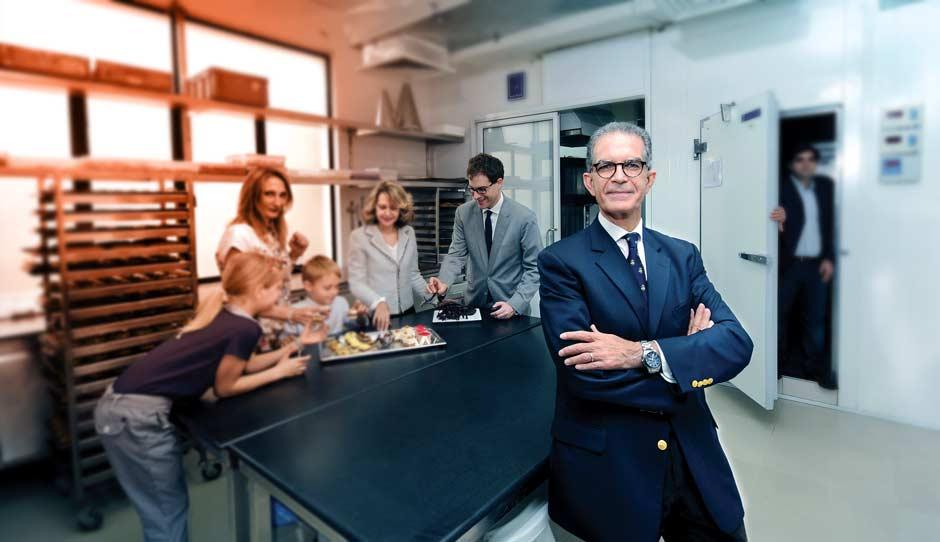Foreign Desis Club: L’Opéra’s Father Son Duo
- BY Shreyasi Singh
 In Strategy
In Strategy 15595
15595 0
0


When Laurent Samandari, managing director of French Bakery, the company that runs the upmarket patisserie and boulangerie, L’Opéra, says he feels at home in India, he more than means it. Samandari, who is from France, lives in a corner bungalow in a leafy Delhi neighbourhood with his maternal grandmother, mother (Christine Samandari) and father, Kazem Samandari, also the company’s chairman. Not very far from there live Laurent’s first cousin, Pierre Nicollier (the company’s CEO), his wife Fabienne Nicollier and their three young children. Together, the Samandaris and Nicolliers are building the “family business” into a popular patisserie brand which in a little over three years has grown to nine outlets in the Delhi-NCR region. L’Opéra is known for its macaroons, French bread and choux pastry, and kneads in monthly sales of Rs.1 Crore a month (approximate average). This is no small task considering its high price points, and thehigh mortality of restaurants in Delhi’s competitive F&B space which is plagued with prohibitive real estate costs and labyrinthine license requirments. Interestingly, Laurent’s India sojourn is courtesy his older sister, Caroline Avanzo, who spent more than seven years in Delhi with her husband, a McKinsey & Co Partner who was stationed in the Gurgaon office from 2005 till late 2012. Laurent first came to India as a management student in January 2008 to put in a six-month internship stint with Usha International, the consumer durable and manufacturing company. He craved French desserts during his stay here but the pastries available at The Imperial, The Oberoi and stand-alone outlets such as Choko La left him unimpressed. So, Laurent set to work to make a detailed business plan for a high-quality French bakery chain in India. His father who had spent three months in India as a backpacking college student in 1967, and has worked in more than 60 countries, was very encouraging. Now, the father-son duo are in the happy throes of building a company. To borrow baking parlance—things have risen fast from their first outlet in DLF Golf Club, Gurgaon in January 2011. They have already invested nearly 12 crore into the business so far, and are working on expansion plans to take the brand to other cities outside of Delhi NCR.
Our Challenges:
Kazem Samandari: Entreprenuers are driven by discovering an opportunity, understanding the challenges and difficulties, and then systematically following an objective without being discouraged and defocused. So, in the beginning itself, we decided on certain guidelines. We wanted to do things perfectly, and decided not to take shortcuts even if things got delayed or more expensive. We are not here to make a quick buck. Of course, it took us an eternity to register the company, to get the papers, get the licenses needed and the authorisations but instead of trying to complain, we tried to learn how to do it right.
In most other economies, you know you will have the basics such as power, water andsuppliers that can guarantee you a standard, consistent quality of supplies. This was an enormous challenge in India. One of the first things we did while setting up our 9,000 square feet bakery facility in India was to install a water treatment system, and a power standby unit. It’s also been a big struggle to identify reliable partners to import supplies for us—you can’t imagine the nightmare, the absolute nightmare of getting a flour which is of a different gluten or moisture content. I exaggerate not that your croissants can change up to 50 per cent if you use the incorrect flour—they just won’t rise. Plus, all our raw materials are imported. Our butter and cream comes from Normandy. When they go through customs here, it is difficult to make sure that they are properly stored and handled. Such infrastructural issues are very, very difficult in India.
 For Laurent Samandari(left) pictured with his father Kazem Samandari(right) the problem lies in the lack of basic infrastructural issues that he would take for granted anywhere else.
For Laurent Samandari(left) pictured with his father Kazem Samandari(right) the problem lies in the lack of basic infrastructural issues that he would take for granted anywhere else. Another bizarre challenge that is unique not to India, but to Delhi in particular is that you can’t have commercial cars that run on anything but CNG. But, engines in CNG vehicles aren’t very strong. There are no commercially available cars that are powerful enough to have sufficient cooling for chilling the pastries when we transport products during the day to our outlets. Delivery is therefore such a challenge for us. We deliver four or five times a day. We had to find a solution to do this—so we got individual chilled transport units. They cost a hell lot of money but we’re now able to deliver chilled products, and keep them at 5 degree-6 degree Celsius for up to 10 hours.suppliers that can guarantee you a standard, consistent quality of supplies. This was an enormous challenge in India. One of the first things we did while setting up our 9,000 square feet bakery facility in India was to install a water treatment system, and a power standby unit. It’s also been a big struggle to identify reliable partners to import supplies for us—you can’t imagine the nightmare, the absolute nightmare of getting a flour which is of a different gluten or moisture content. I exaggerate not that your croissants can change up to 50 per cent if you use the incorrect flour—they just won’t rise. Plus, all our raw materials are imported. Our butter and cream comes from Normandy. When they go through customs here, it is difficult to make sure that they are properly stored and handled. Such infrastructural issues are very, very difficult in India.
For all these challenges, we took a very pragmatic, systematic approach to go to the root cause, look for solutions, and set them right before we moved ahead. We spent nearly a year— all of 2010—to create this infrastructure before we even baked our first croissant. Other than all of this, the rest is the same as running an F&B business anywhere else—branding, service and the look-and-feel of your outlets.
There’s a lot in common between French and Indian culture. They are both very relationship driven.
The India Opportunity:
Laurent Samandari: In 2008, when I first came to India, every day in France there was a big story about the potential of business in India. I haven’t been disappointed. With L’Opéra, we are in for the long term. We want to build a strong brand across India and the fact that so much of my family largely lives out of here now shows our next several years will be spent building the brand in India. Every person of the family is involved in some way in running the business—my mother takes care of the customer experience aspect, Fabienne helps out with our event catering vertical. Of course, the business environment has been difficult in the past 12-18 months. But, we are not distracted by a year or two of slow growth. Yes, we feel the pinch of the general economic condition too. So, we’ve tweaked our expansion plan. Instead of organic growth in each of our outlets, we’ve opened new stores to grow at more than 15 per cent.
Personally, India has been great. I think there’s a lot in common between French and Indian culture. They are both very relationship driven. Plus, there is a so much to discover in India. If you take just food, there is so much you can sample. I’ve lived in Singapore too. It was an interesting experience but I feel more comfortable here. Obviously, infrastructure bottlenecks and little respect for punctuality are pet peeves. In fact, recently, I was travelling in Holland and I was so surprised that the train arrived at the station at exact second it was scheduled. These things surprise me now!





























Add new comment